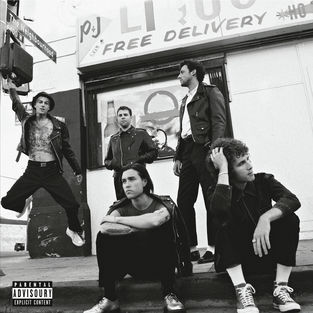The Neighbourhood’s The Neighbourhood: A Self-Titled Album by Nico Léger

The Neighbourhood, an American indie band with a dark, British aesthetic, has been releasing music since their first single “Female Robbery” was dropped in 2012. Yet, it is only in March of 2018 that they have finally released a self-titled album, despite them making music for the past six years. With previous hits, such as “Sweater Weather” which peaked at number fourteen on Billboard’s Hot 100 in 2013, and “Daddy Issues” from their 2015 album, Wiped Out!, the group has garnered an expansive discography during their time together. So, with the release of The Neighbourhood, a twelve track album, they have redefined themselves, giving their audience a clearer picture as to who they are as a band. And, through familiar, yet relatable themes of self-doubt and insecurity, The Neighbourhood has assimilated old with the new, introducing an honest reflection of their career thus far and lead singer, Jesse Rutherford’s, own identity.
Flowers, the first title-track, introduces the album with an onset of complications. Listeners familiar with The Neighbourhood anticipate their willingness to write lines that have an appeal of shock value and immediate comprehensive understanding. A clear example of this is the song “Wires” off of their first full album, “I’m Sorry…” which has a key chorus line, “If he said help me kill the president / I’d say he needs medicine.” However, “Flowers” uses an approach rarely seen by The Neighbourhood, demonstrating how Jesse has reshaped his artistic style from the gecko. “Flowers” is disguised as a love song, and continues to be interpreted as one if a listener fails to look too deeply into the song’s meaning. The usual lyrical bluntness is absent. Rather, there is simply an evident power imbalance reflected, with the lines, “every day, you want me to make / something I hate, all for your sake.” In actuality, “Flowers” is an exploration of the constraints Jesse faces from the media, being called a “rip-off” for their music being too mainstream, and even reflecting themes of femininity with, “Bought some new clothes / Then I polish my toes / Then I powder my nose / In case you get close (get too close, baby).” In this, there is the combined message of Jesse hiding himself in the past due to being under a scrutinizing public eye, yet, particularly under a lens of femininity that he has not expressed before in his music.
The seventh track “Sadderdaze” revisits this pressure of being a musician under public critique. It’s a sad and earnest reflection, highlighted through the initial use of guitar, which purposefully matches, “Dirty fingernails, same as your mind / But he could strum the guitar just fine.” The pressure of The Neighbourhood’s increasing fame as a band has evidently had an effect on Jesse’s mental health, which he discloses in this lyric. As the song evolves and picks up into a mournful repetition of being “used” by Saturdays, which is interchanged with “sadderdaze,” the guitar disappears and becomes the electronic piano and heavy drum beat that listeners are well acquainted with. Although it is not explicitly said what Jesse is distraught over, listeners can piece together the message of the song by reflecting on the negative emotions that come with being taken advantage of in the music industry. “Sadderdaze” concludes with the eery, screechy noise of a guitar pick running along the fine lines on a metal guitar string, leading listeners to wonder how sadderdaze use Jesse, as it is never elaborated on.
In spite of these changes and inquiries, longtime fans of The Neighbourhood can find that their content has not strayed from their initial style. As the first single released, “Void” grips listeners with its compellingly heavy themes. The song is a cry for help in its expression of one’s demands for stimulants — such as drugs and sex — in order to, “fill the void.” While the most prevalent instrument is an electronic piano, it’s numb and dull, serving to emphasize the emptiness that the lyrics compel, that despite the upbeat melody, the lyrics are those merely describing one coping.
“Void” is followed by similar songs of insecurity and doubt, especially surrounding love. “Scary Love”, for instance, explores the insecurities and uncertainty that come with intimacy in relationships. This vulnerability can be often located throughout The Neighbourhood’s music portfolio. With vulnerability, there is still a sense of warmth and comfort communicated, as Jesse sings in the second verse, “Drivin’ through the city with me / Just watching you glow / I’m in the passenger seat, you’re in control.” This imagery is vivid, bringing listeners into an immersive nighttime setting, of being surrounded by neon lights with a significant other and in a place of excited discomfort. All the same, the discomfort is worsened when that significant other is raised on a pedestal in a way that insights fear and insecurity. Though this is not a new topic for The Neighbourhood, or love lyrics in general, it is genuine and accurate. With their new release, The Neighbourhood is staying true to their audience and roots.
The Neighbourhood has reconceived their music style and the themes that come through in their lyrics with their new self-titled album. With this release, they demonstrate a new-found confidence in their work and experiment with different approaches to creating music and delivering a message to their growing fanbase. The self-titled album serves as an introduction to the group, showing that, even though they have been releasing music consistently since 2012, they are ever-evolving, and never staying too comfortable with their current style.
Nico Léger is a student at Brandeis University studying English, Creative Writing, and East Asian Studies.
